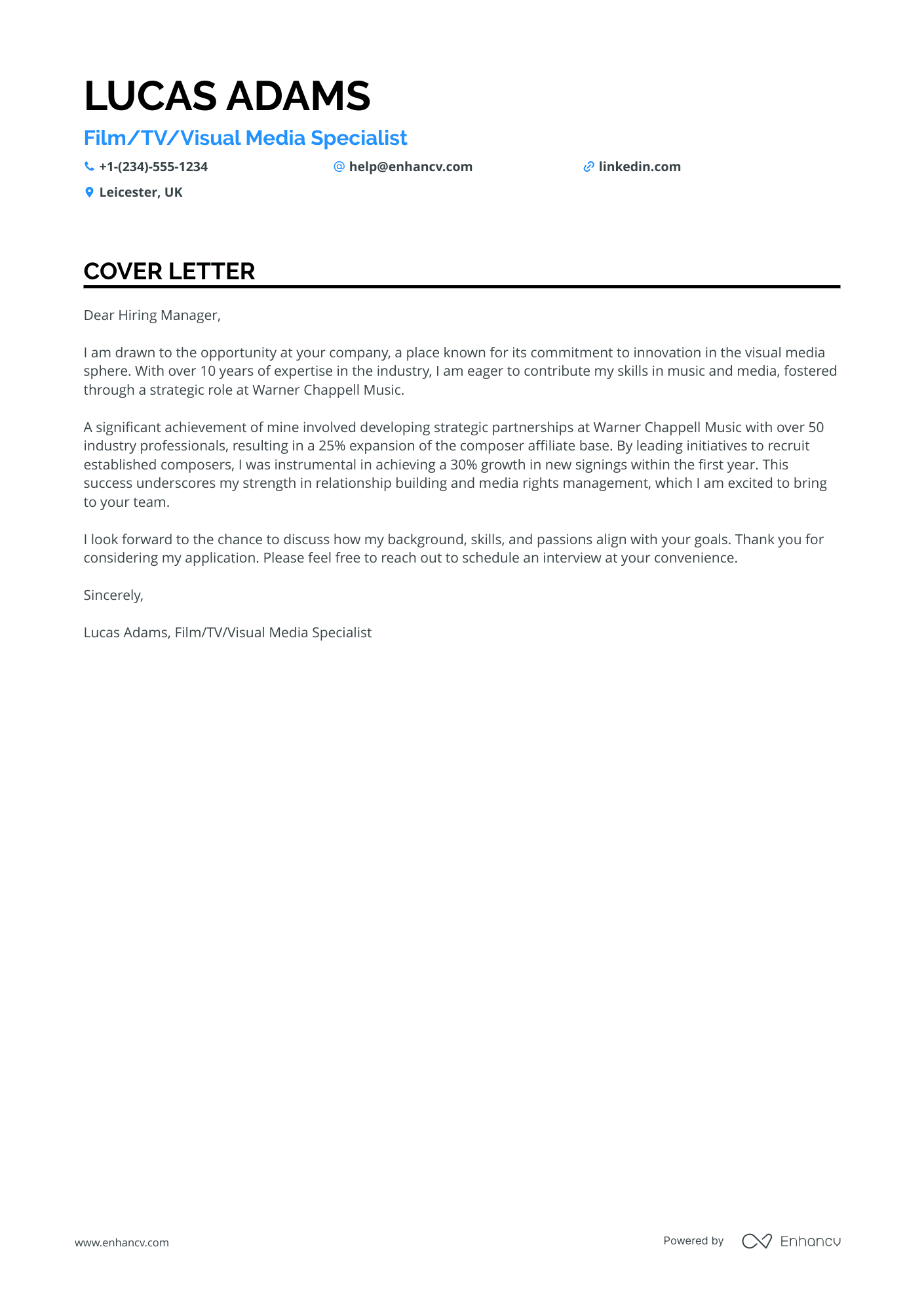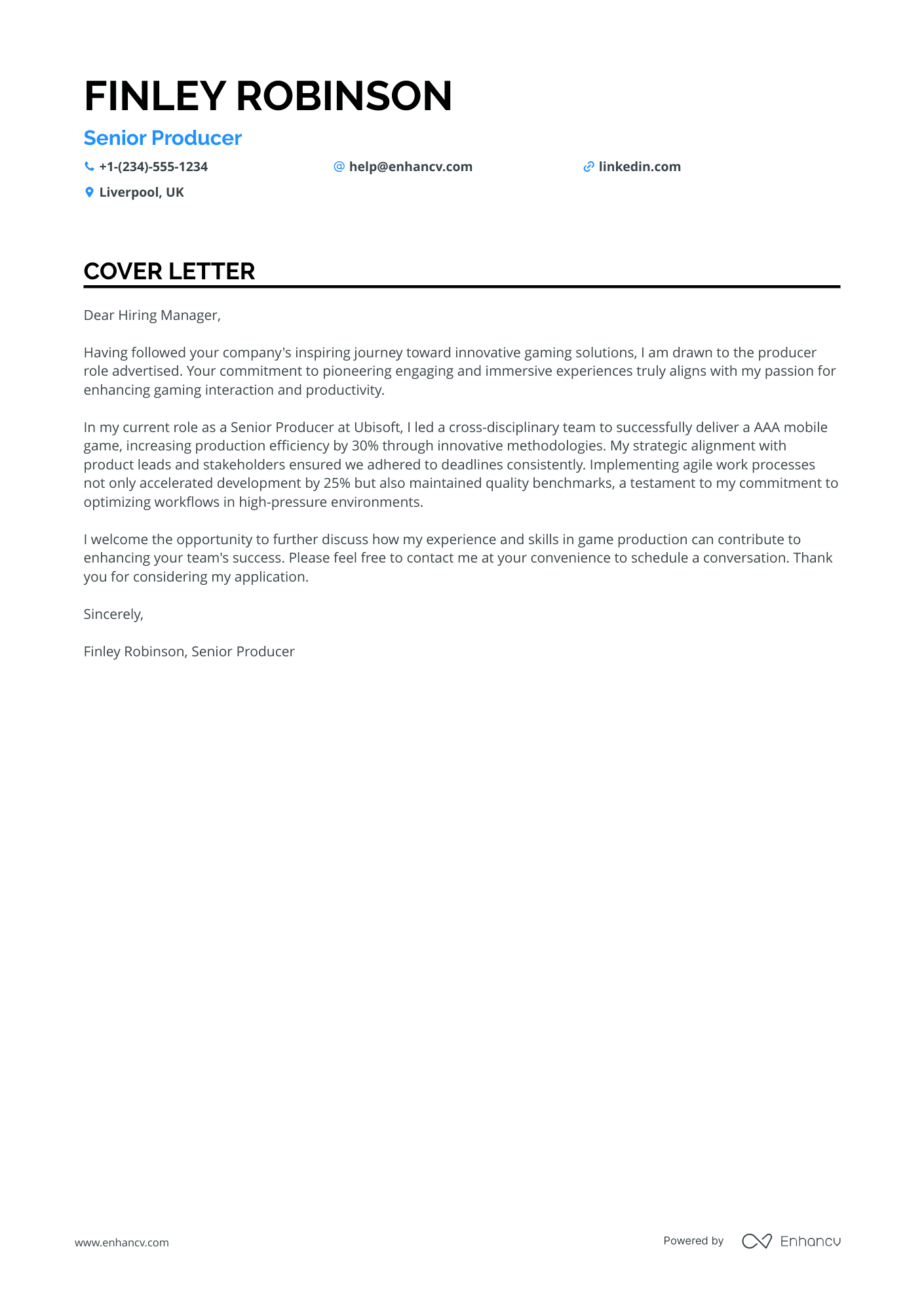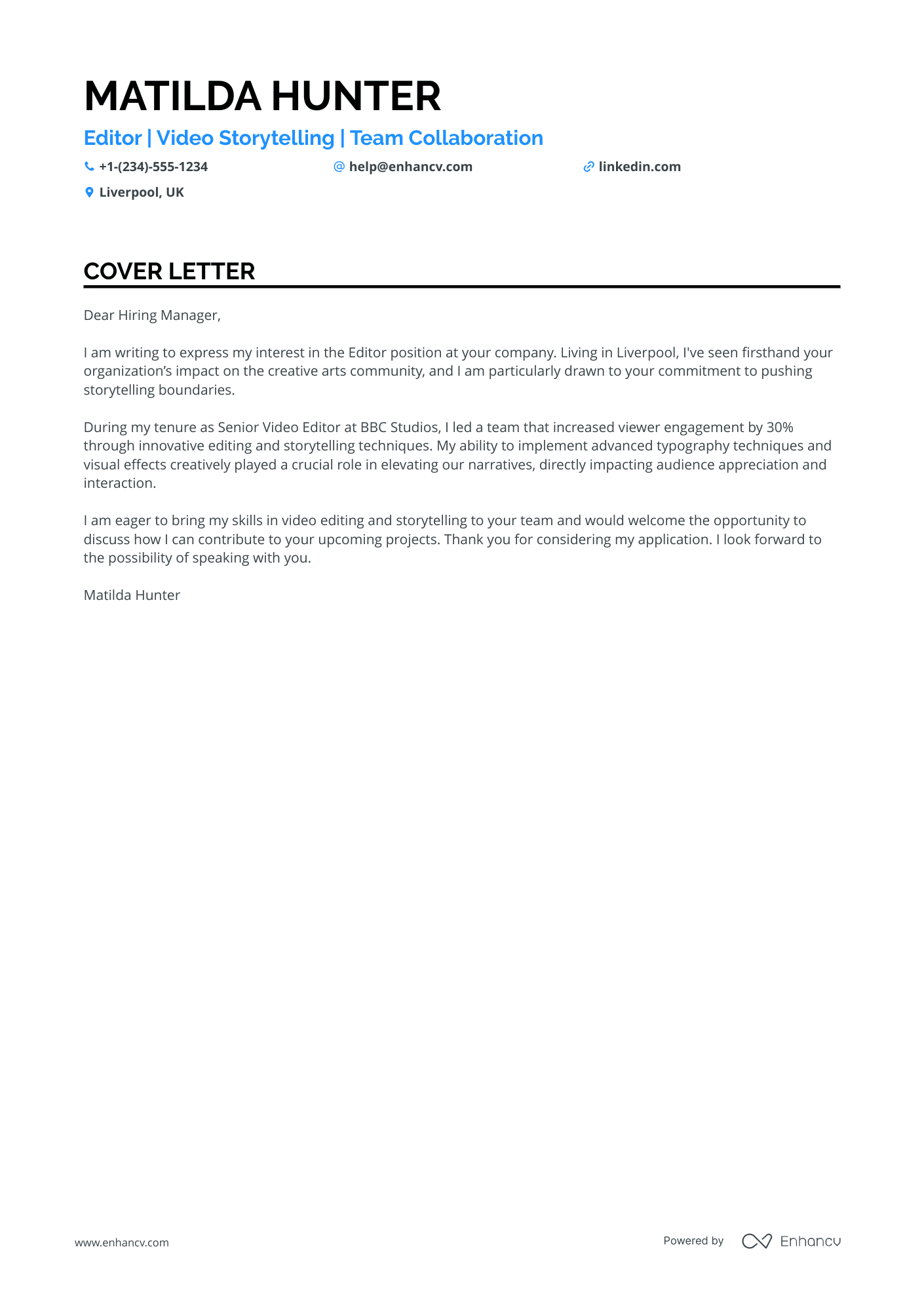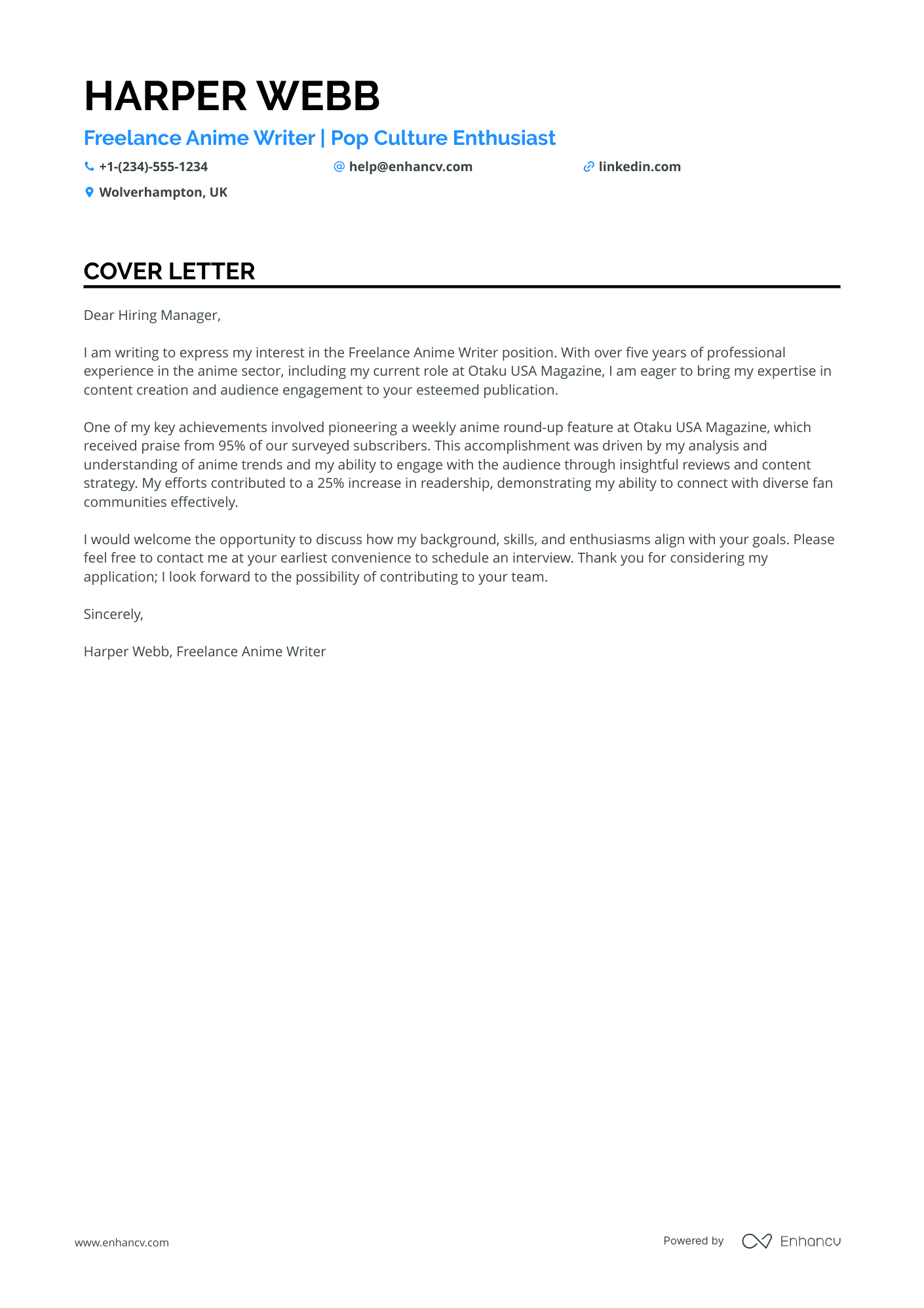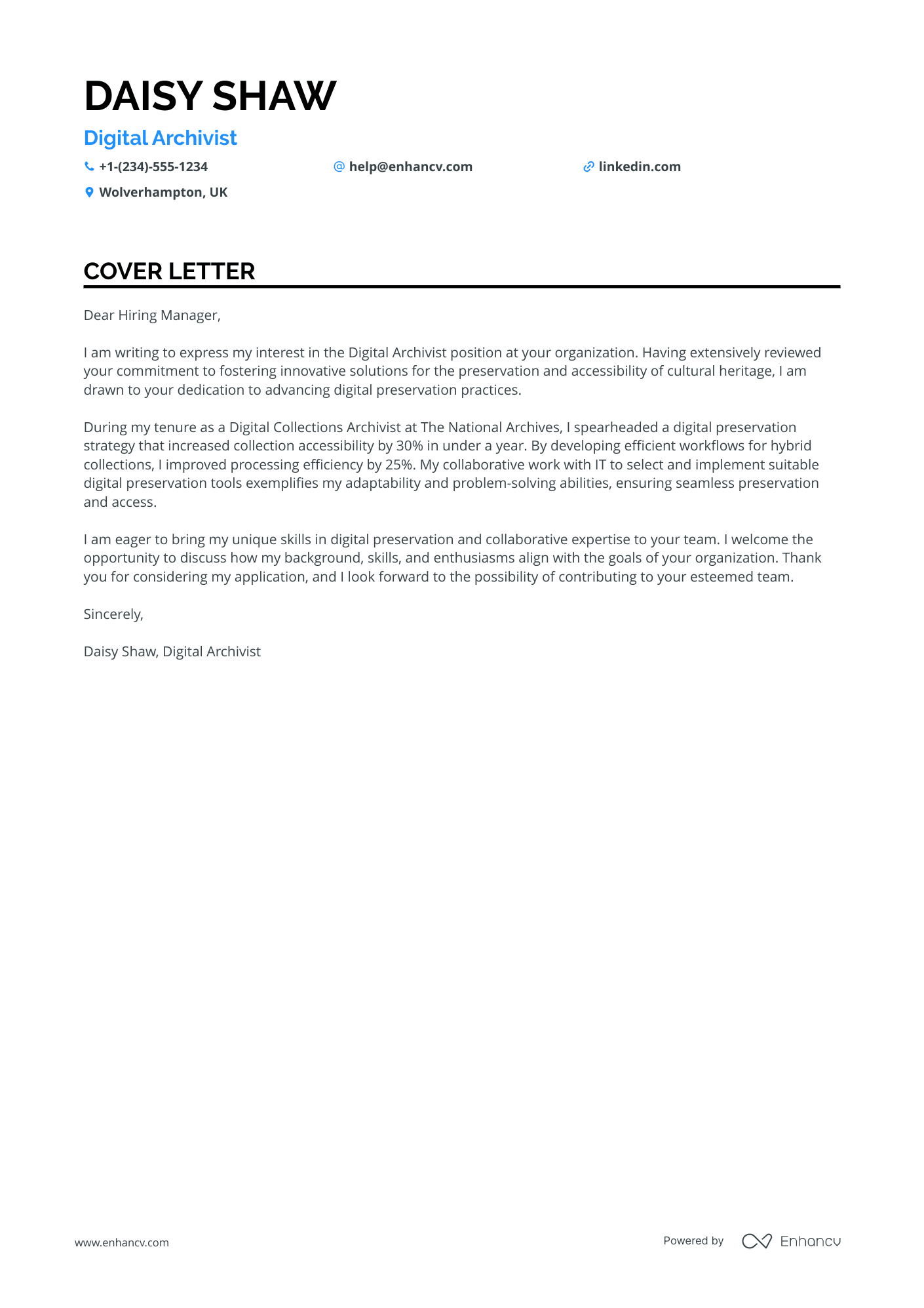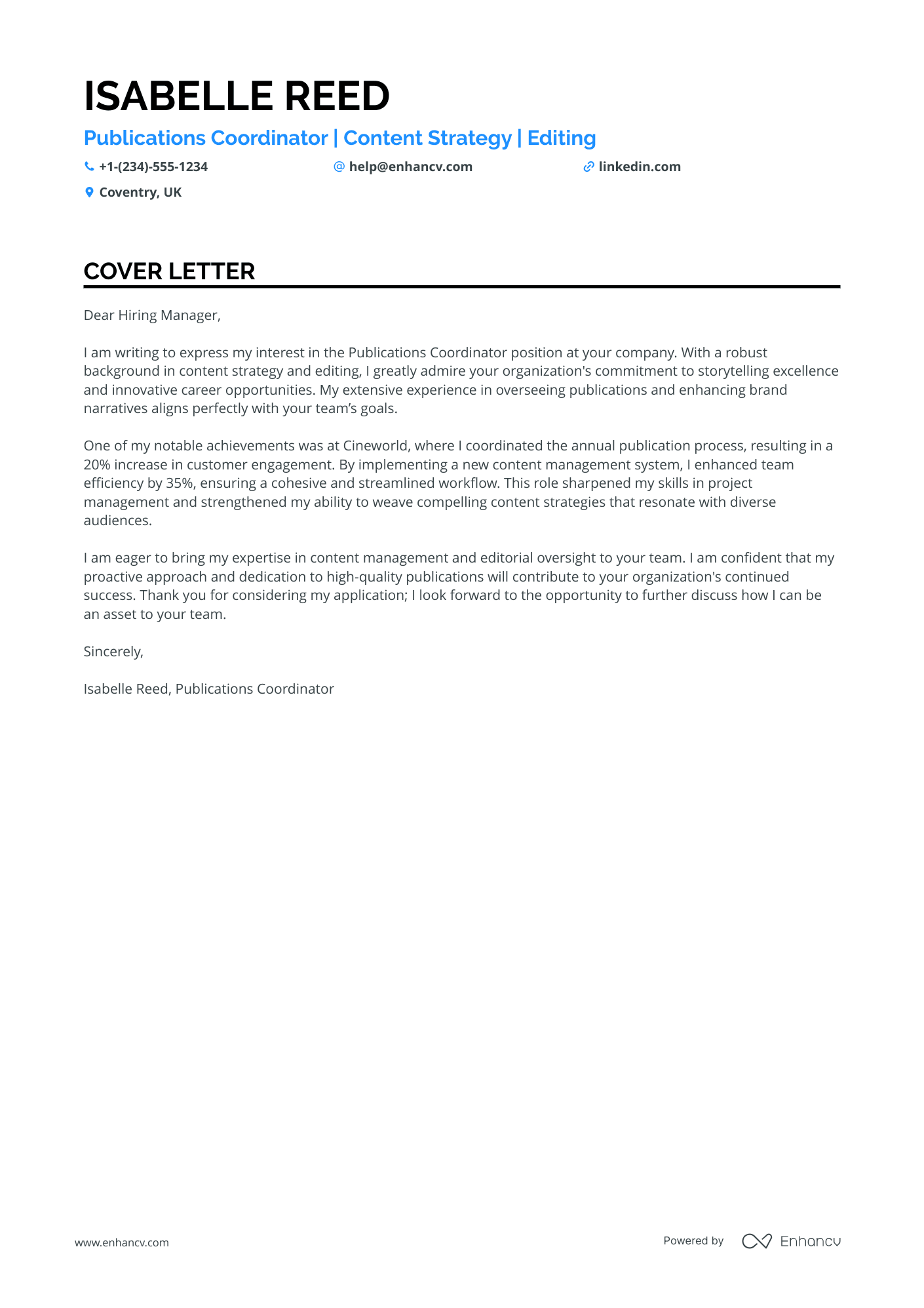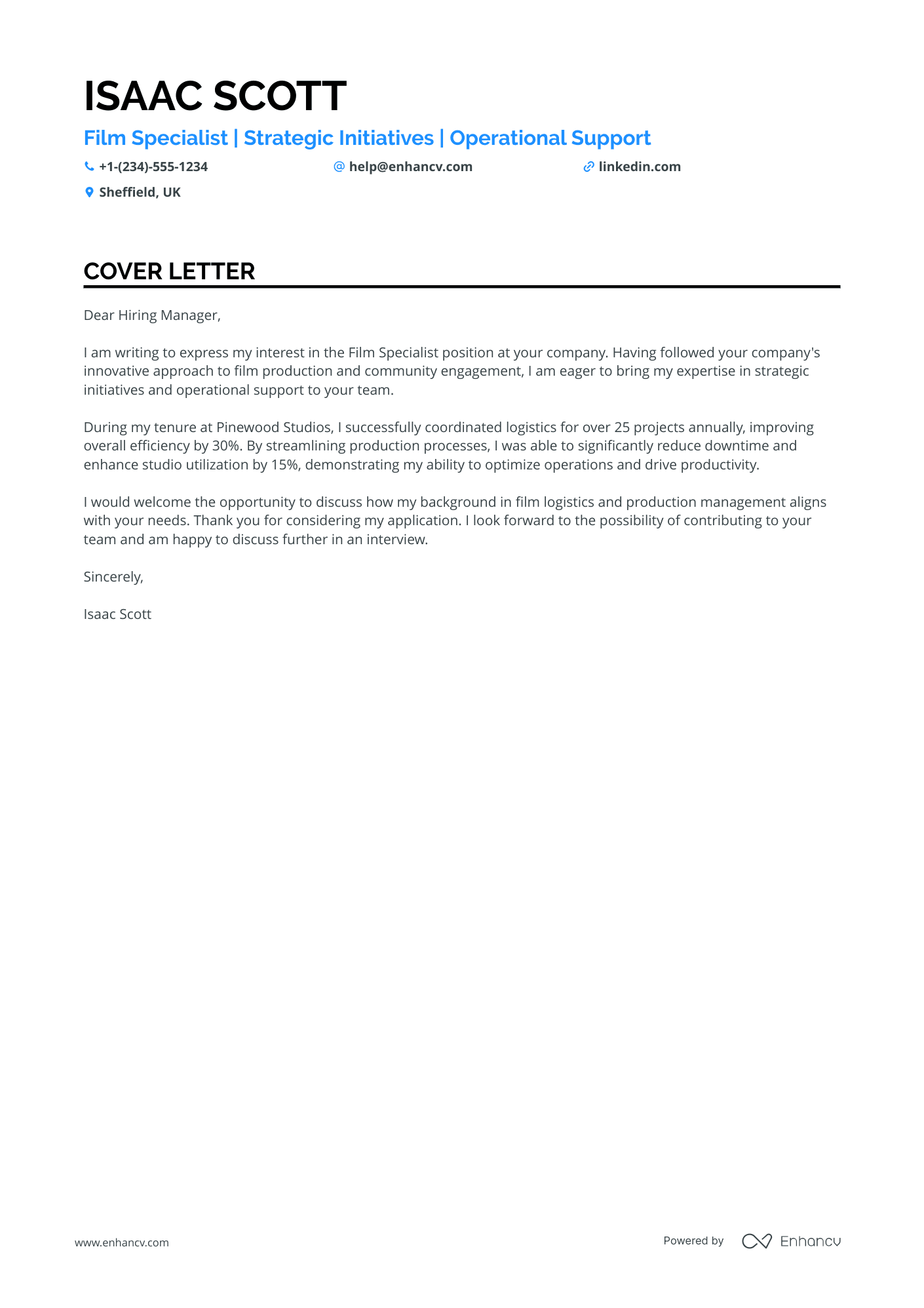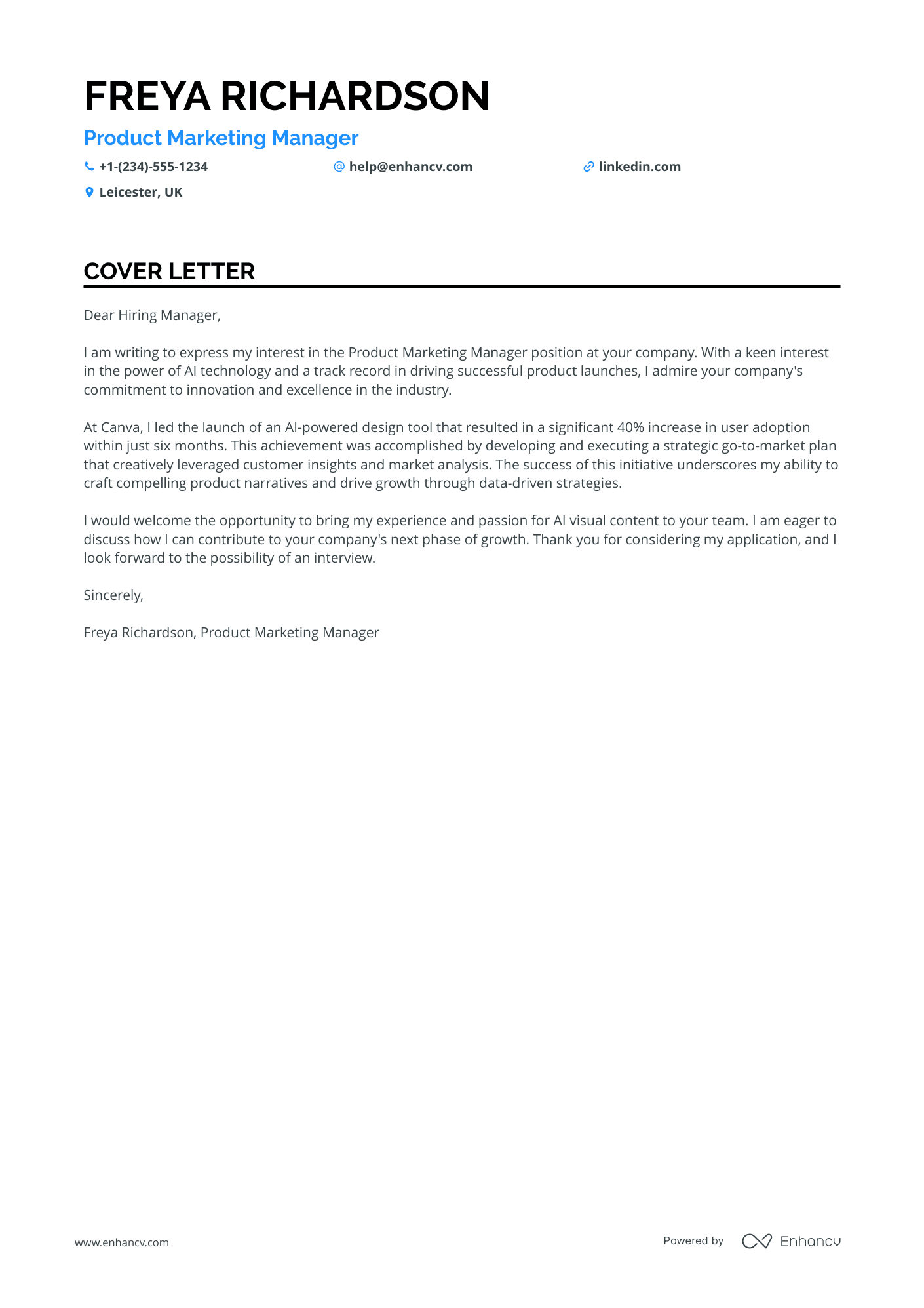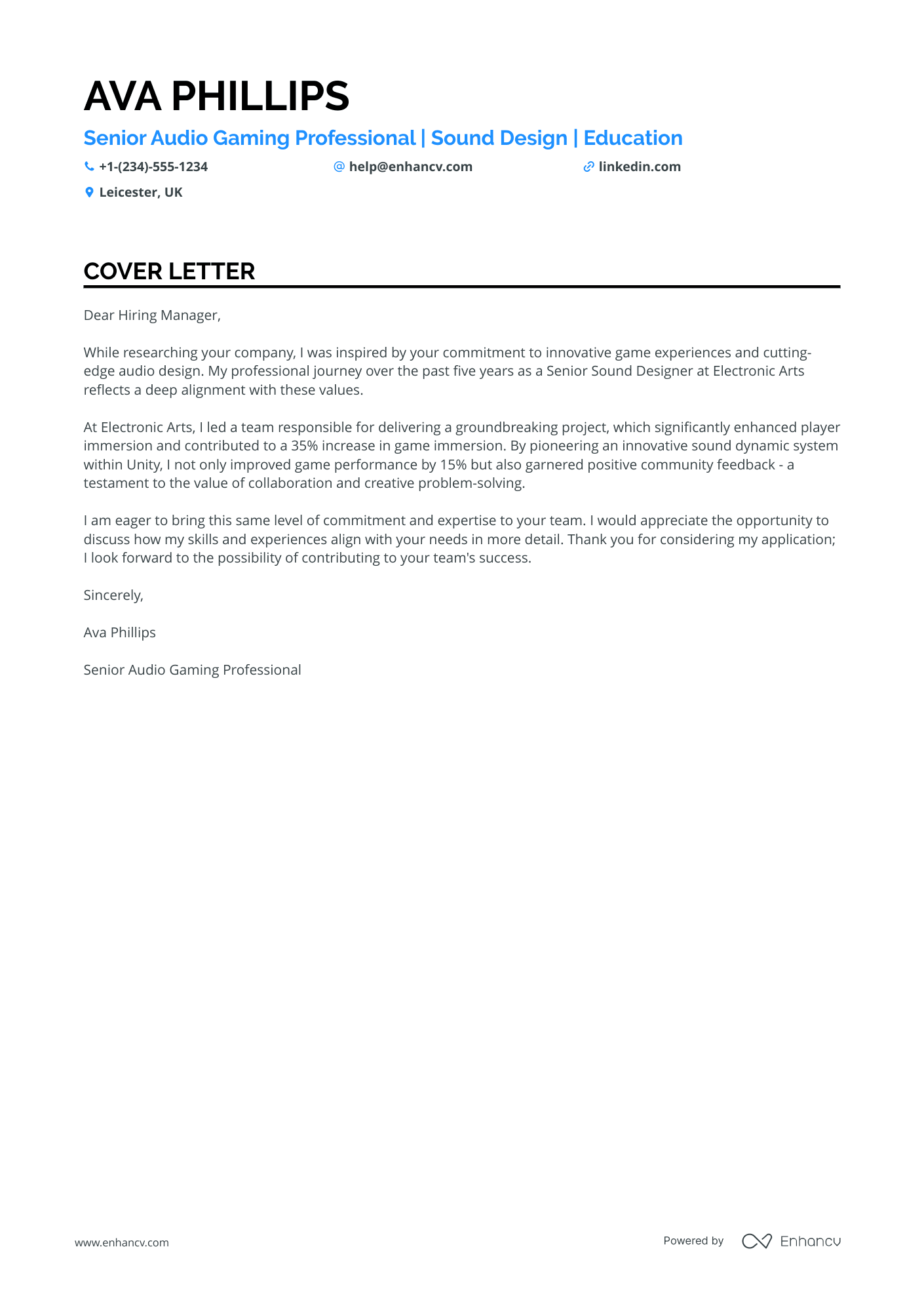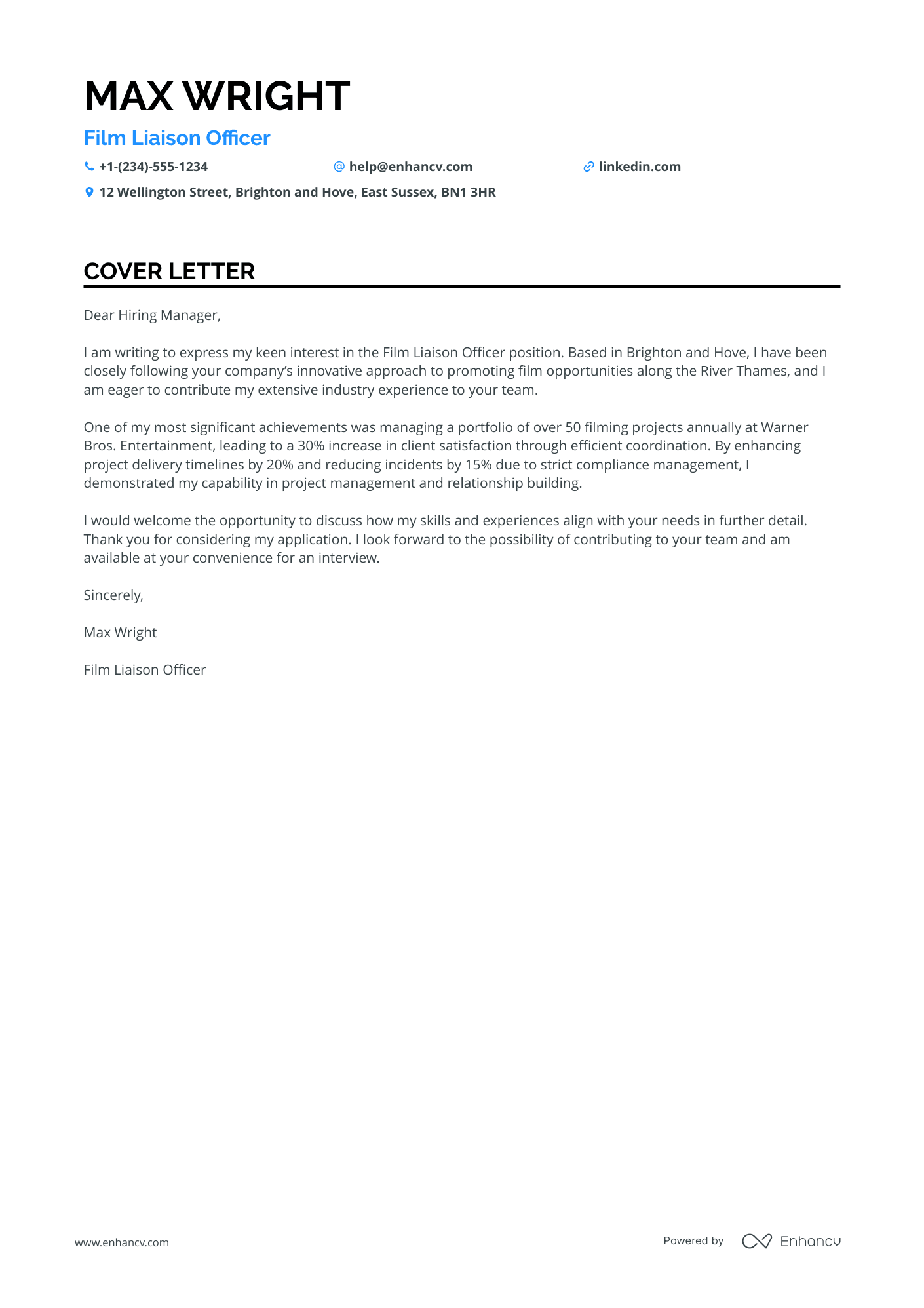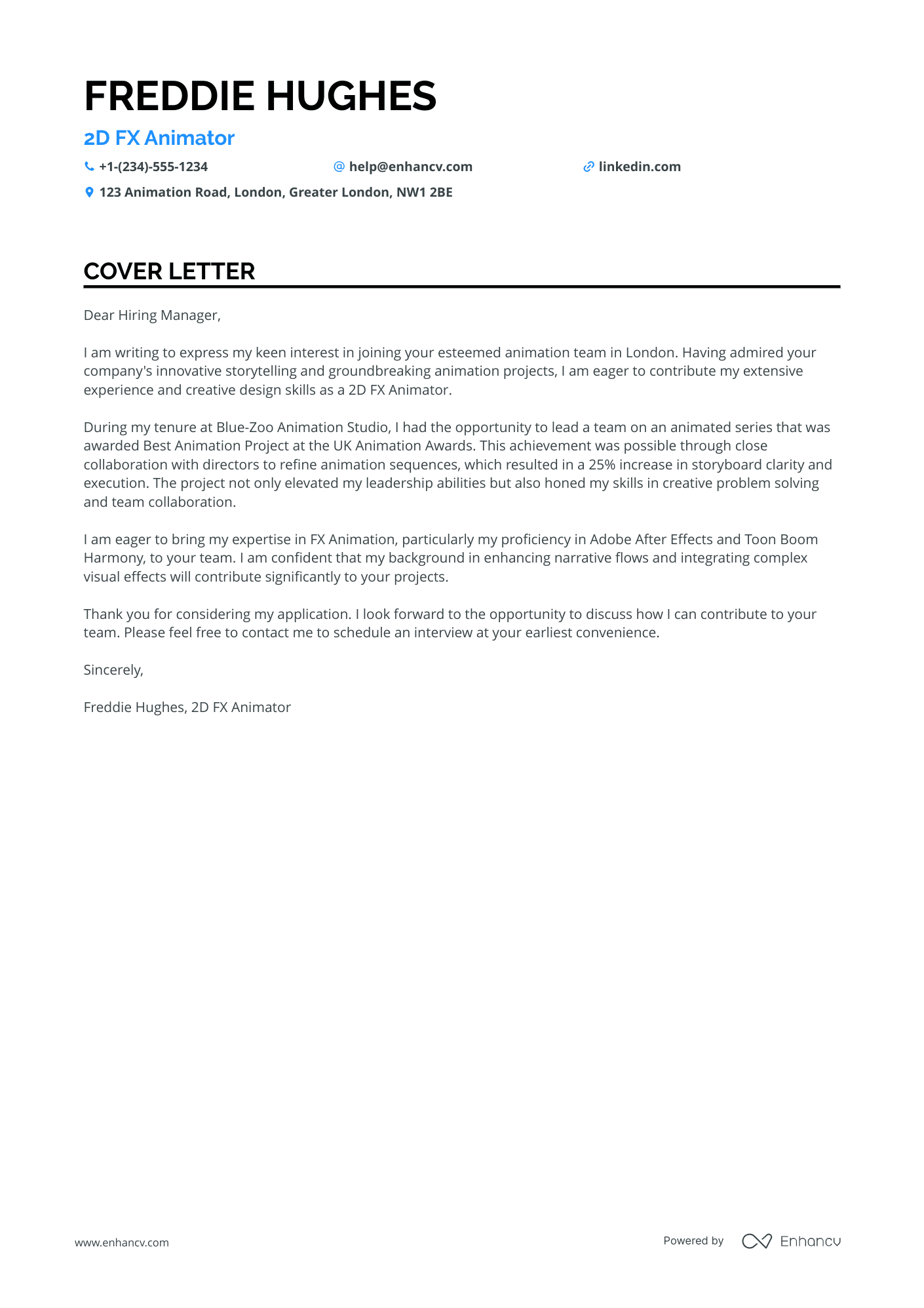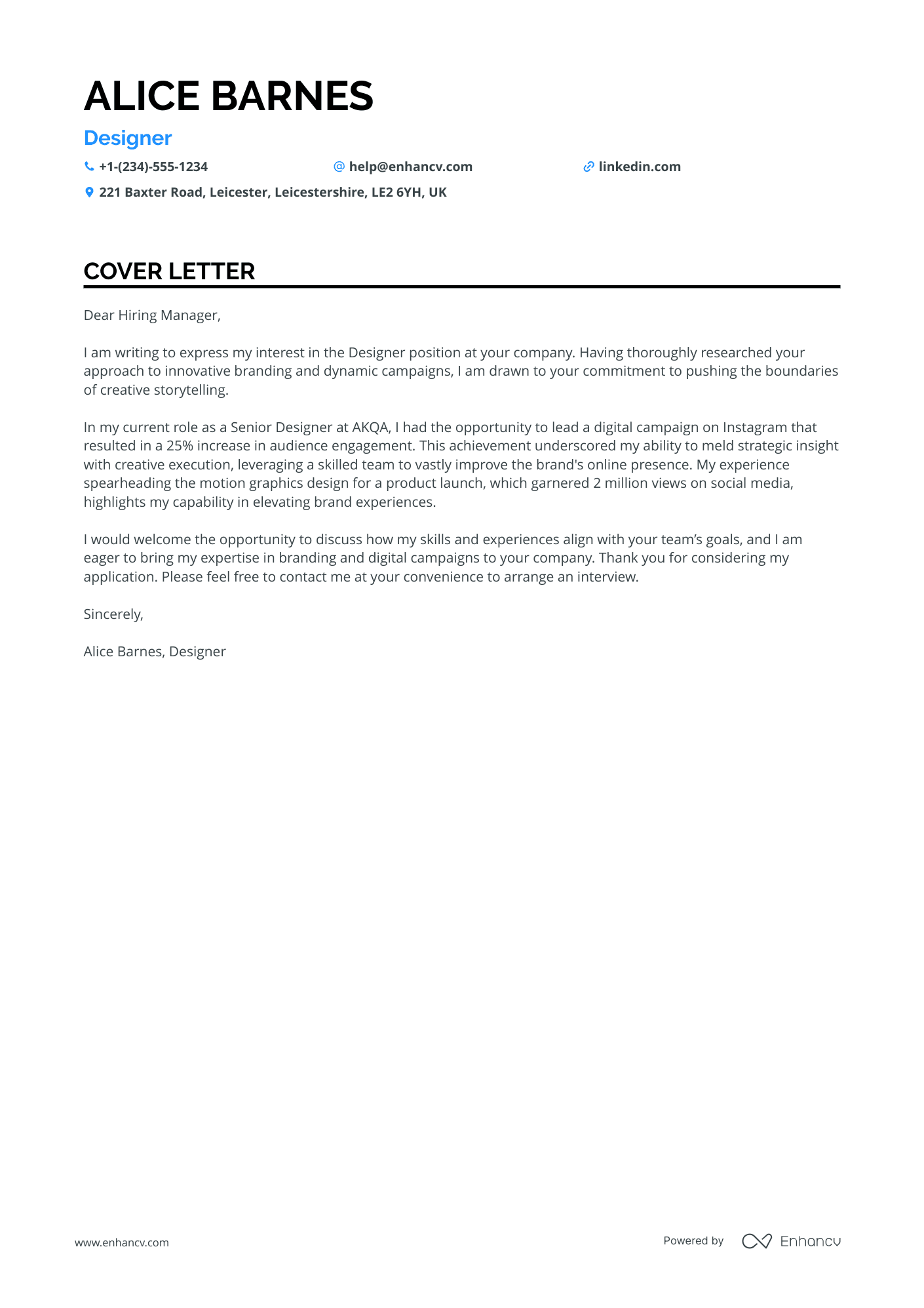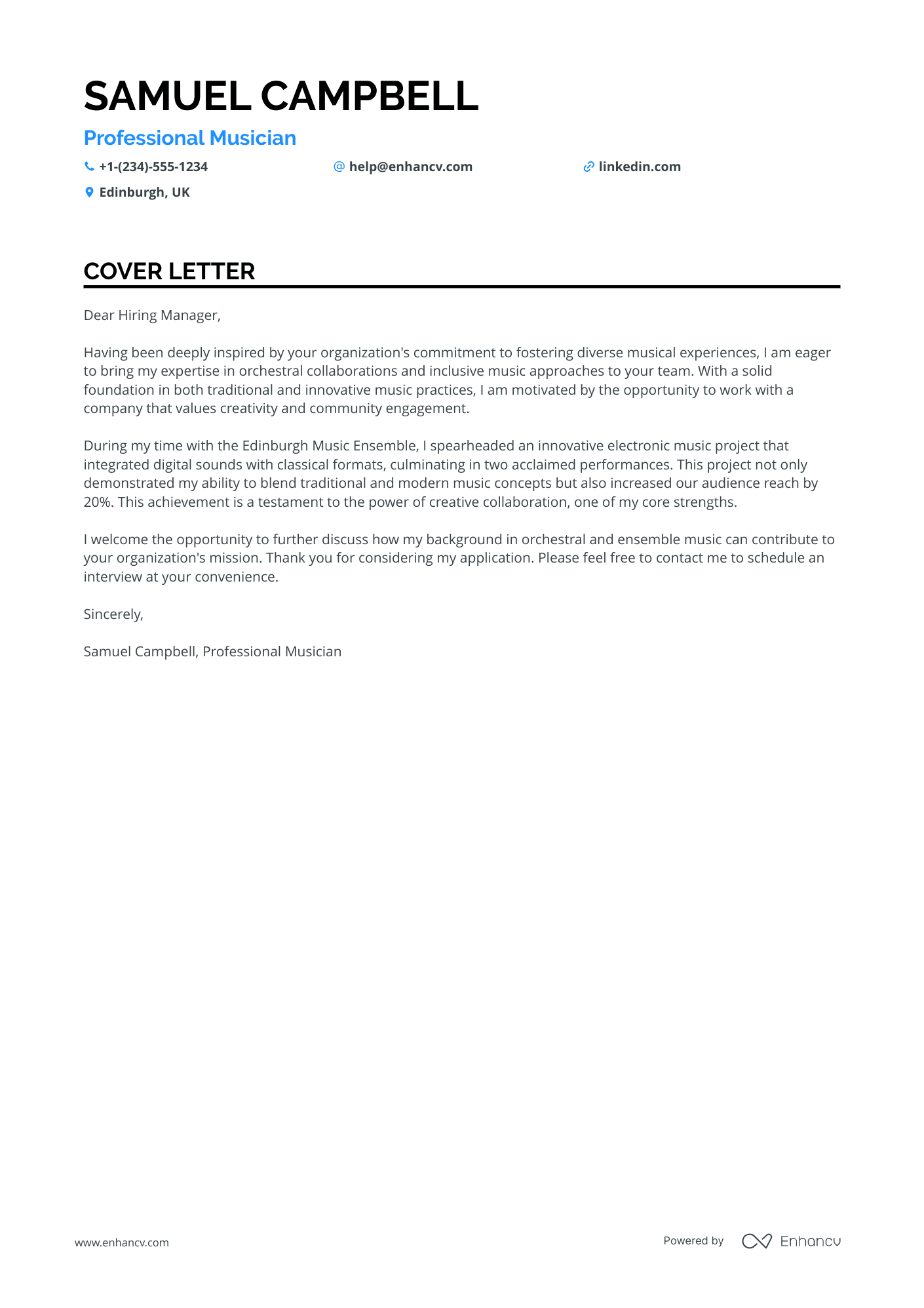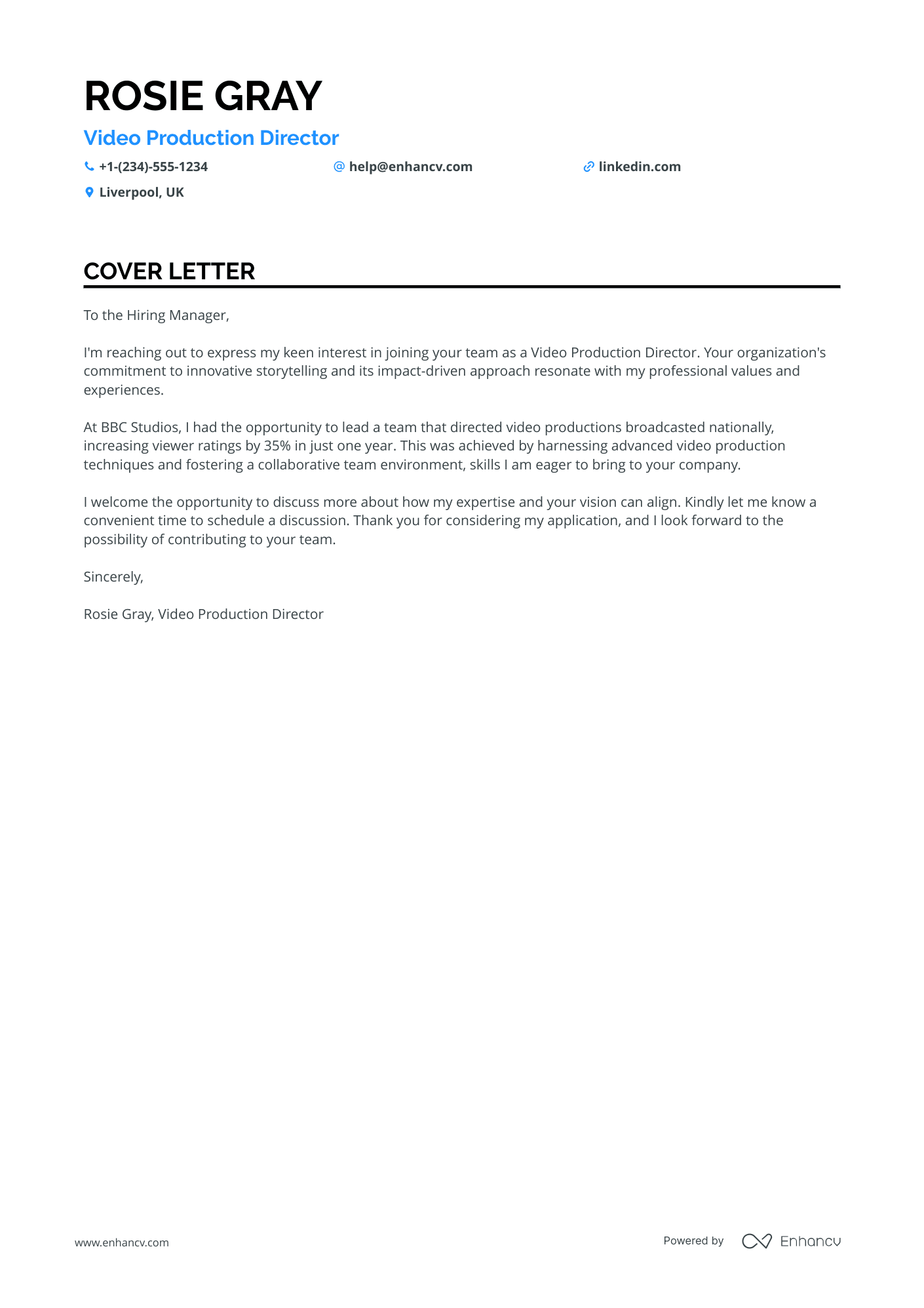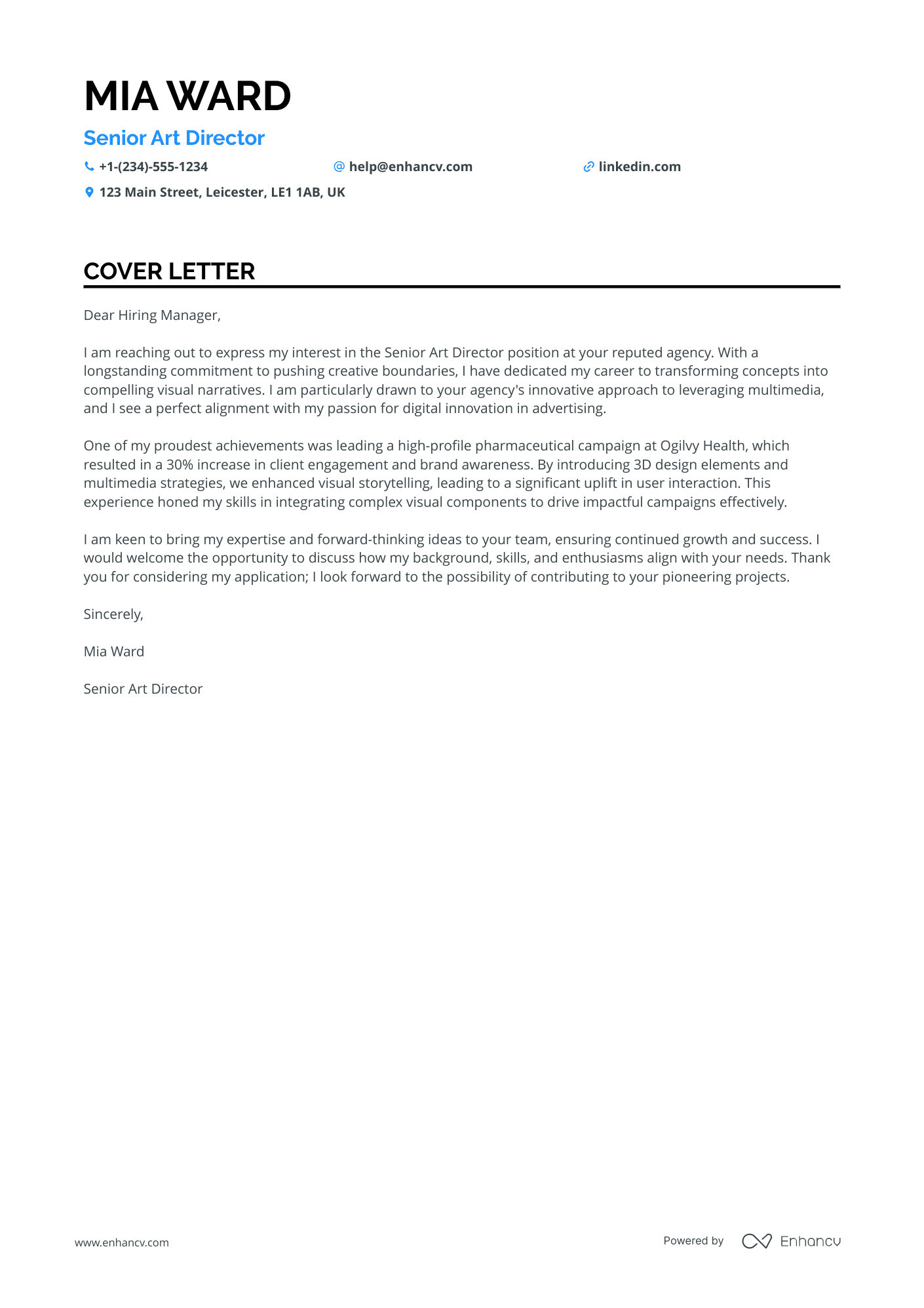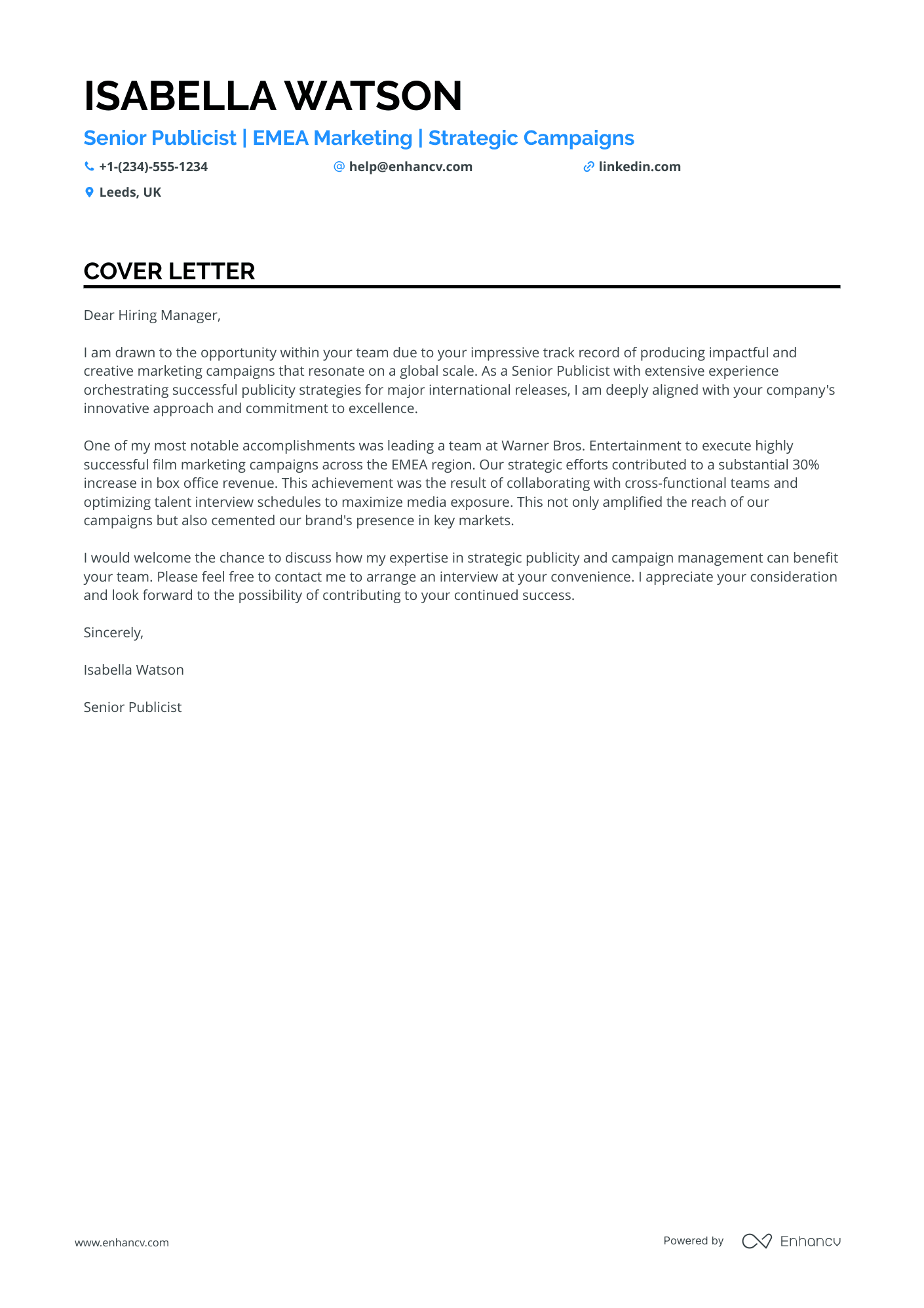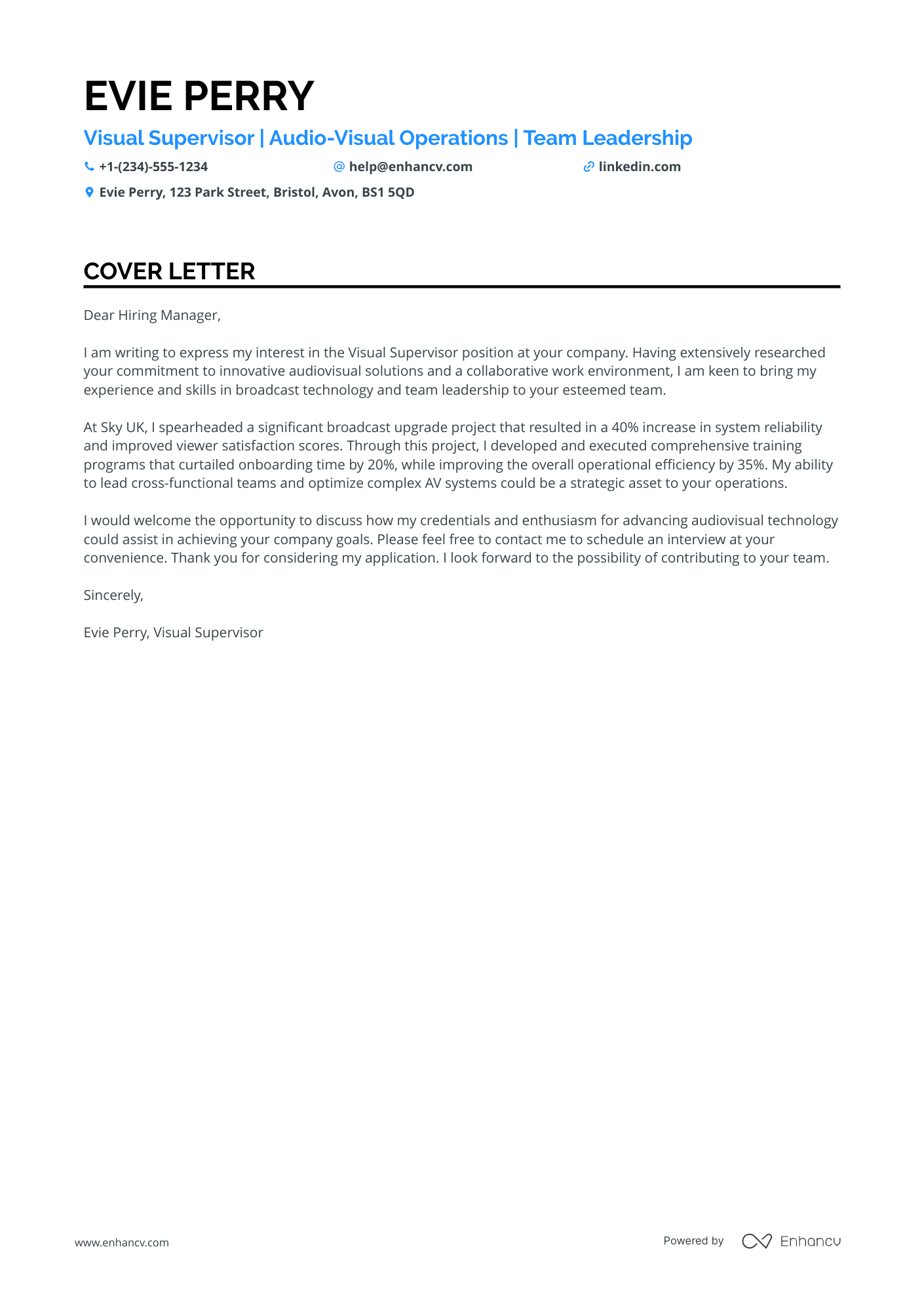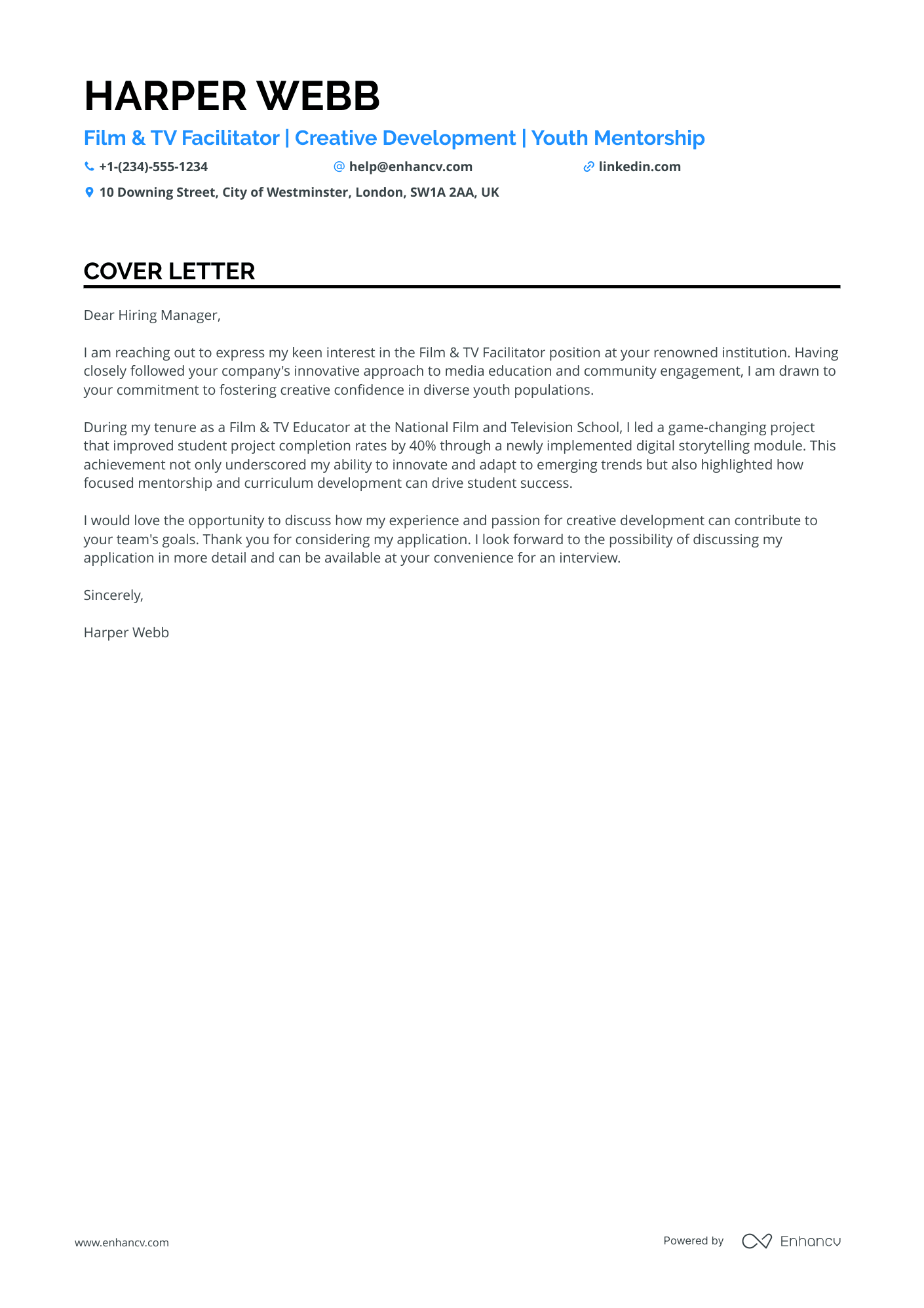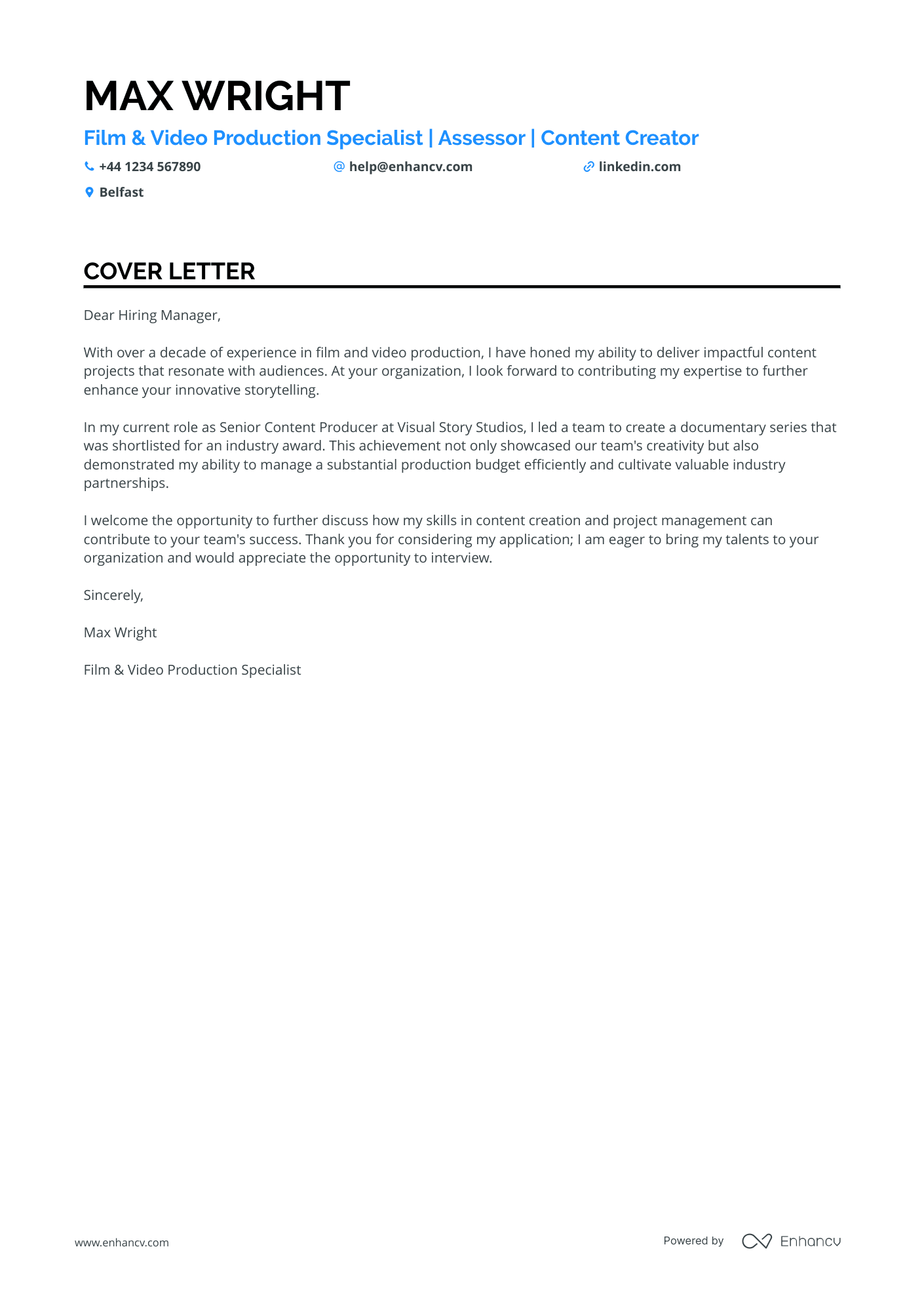When you start applying for jobs, you quickly realise that including a cover letter with your CV is a excellent way to stand out. But what should your cover letter focus on?
Should it emphasise your key achievements or simply list your responsibilities? And how can you effectively demonstrate that you're the ideal fit for the role?
One of the most common mistakes candidates make is either underselling themselves or overstating their experience.
In this guide, you’ll learn how to craft a compelling cover letter by showcasing your most significant professional achievement and telling the story behind it.
Cover letter examples for film
By Role
Film Director
- Emphasising Industry-Specific Experience: Highlighting over 10 years of experience and specific roles in major companies like Warner Chappell Music, Sony Music Entertainment, and Universal Music Group showcases deep industry knowledge and credibility.
- Quantifiable Achievements: Including metrics such as a 30% increase in composer signings and a 15% revenue boost through licensing agreements provides concrete evidence of success and impact.
- Relevant Skillset: Focusing on industry-relevant skills such as media rights management, licensing, and data analytics underlines the candidate’s breadth of capabilities necessary for the role.
- Educational and Course Credentials: Listing formal education such as a Master of Arts in Music Business Management and complementary courses from reputable institutions adds to the candidate's expertise and commitment to ongoing learning.
Film Producer
- Emphasise Relevant Experience: Include leadership and project management roles, such as Finley Robinson's experience as a Senior Producer managing cross-disciplinary teams at companies like Ubisoft and Electronic Arts, demonstrating the ability to oversee large-scale projects.
- Highlight Industry Tools and Methodologies: Mention proficiency in industry-specific tools like Jira, Unity, and Hansoft, as well as methodologies like Agile, which are crucial for a Senior Producer role in gaming.
- Underline Major Achievements: Use specific examples like leading the delivery of a AAA mobile game or implementing strategies that improved team efficiency by 30%, showcasing substantial contributions to past projects and the potential for future success.
- Showcase Education and Continuous Learning: Mention relevant degrees and additional courses completed, such as a Master's in Game Development and Agile Project Management Certification, to demonstrate ongoing professional development in alignment with the role.
Film Editor
- Emphasise concrete achievements and impacts, such as the 30% increase in viewer engagement and streamlined workflows, to demonstrate tangible contributions and success in previous roles.
- Highlight specialised skills like Adobe Creative Suite, Final Cut Pro, and 3D Animation, underscoring technical expertise essential for advanced video editing roles.
- Mention leadership and teamwork capabilities, showcased by leading teams, conducting workshops, and collaborating with writers and directors, to indicate effective collaboration and mentoring abilities.
- Incorporate relevant certifications, like the Advanced Adobe After Effects course, to demonstrate ongoing professional development and expertise in high-demand software.
Film Critic
- Highlight industry-specific experience: The cover letter emphasises the writer's extensive experience in the anime industry, detailing specific roles and achievements, such as increasing readership and page views, which demonstrates their expertise and the value they can bring to an employer.
- Showcase skills pertinent to the role: Critical skills such as SEO Techniques, Content Strategy, and English Language Mastery are mentioned, demonstrating the writer's capability to produce high-quality, optimised content that can reach a broader audience.
- Utilise quantitative achievements: The cover letter uses quantifiable achievements, such as a 25% readership increase and a 50,000 boost in page views, to illustrate the writer’s impact and ability to contribute positively to a team.
- Reference relevant education and training: Educational achievements such as a Master's in Film Studies and specialised courses in SEO and Popular Culture Writing are included to demonstrate the writer's commitment to refining their craft and staying current in their area of expertise.
Film Archivist
- Highlighting Relevant Experience: The cover letter effectively showcases Daisy's extensive experience in digital archiving roles, signalling her expertise and suitability for positions requiring specialised knowledge in digital collections and preservation.
- Showcasing Measurable Achievements: By incorporating specific statistics and percentages, such as a 30% increase in accessibility and a 25% enhancement in workflow efficiency, the letter provides tangible evidence of Daisy's impact in her previous roles.
- Mentioning Specialist Certifications and Skills: Identifying courses like the DAS Certificate and skills such as "Digital Preservation" and "Digital forensics" supports the suitability for roles within digital archiving, reinforcing her technical expertise.
- Emphasizing Collaborative Efforts: The cover letter underscores Daisy's ability to collaborate effectively with IT and Records Management teams, which is crucial for roles that require cross-departmental cooperation to manage digital collections.
Film Distributor
- Emphasise the candidate's achievements in enhancing content production efficiency and accuracy, which are crucial for a Publications Coordinator role.
- Highlight the candidate's leadership skills in cross-departmental collaboration, ensuring timely and effective project delivery.
- Underscore the importance of the candidate's proficiency in both English and Spanish, which can enhance communication in international settings.
- Mention the candidate's academic background in Film Studies and English Literature, which reinforces their expertise in handling film-related publications.
Film Restoration Specialist
- Emphasise accomplishments: The cover letter should concisely highlight specific achievements, such as the 30% increase in production efficiency and involvement in award-winning film projects, to demonstrate impact and success in previous roles.
- Showcase relevant experience: Detailing roles in high-profile studios like Pinewood Studios and Warner Bros. Studios underlines the applicant's extensive experience in the field, making them a strong candidate for positions requiring expertise in film logistics and operations.
- Mention strategic initiatives: Discussing the development and implementation of educational programmes that engaged over 100 students highlights the candidate's ability to craft strategic initiatives and contribute positively to industry engagement.
- Highlight professional development: Including courses such as the Film Production Masterclass from BFI underscores the applicant's commitment to professional development and mastery of advanced film production techniques.
Film Marketing Manager
- Highlighting Relevant Experience: The cover letter effectively draws attention to the applicant's over three years of experience in AI visual technology, aligning well with the Product Marketing Manager role.
- Quantifiable Achievements: Clearly stated accomplishments, such as increasing product adoption by 35% and achieving significant sales growth and user satisfaction, provide concrete evidence of the applicant's impact in previous roles.
- Strategic Skills and Expertise: Emphasising key skills such as GTM strategy, product positioning, and cross-functional team management showcases the candidate's strategic competence and leadership capability relevant to the role.
- Alignment with Industry Trends: Passion for AI technology and innovative content creation demonstrates forward-thinking and a keen interest in industry developments, integral for a role involving AI visual content strategy.
Film Sound Designer
- Emphasising specific software proficiencies such as Pro Tools, Unity, and middleware engines like WWISE and FMOD, crucial for a role centered on audio and game design.
- Highlighting leadership capabilities and team management skills, such as supervising sound designers and leading audio strategies, aligning with senior-level responsibilities.
- Showcasing significant project achievements and results, such as a 30% increase in player engagement and a 97% player retention rate, to demonstrate the impact of sound design contributions.
- Referencing industry recognition and accolades, such as contributing to a game winning 'Best Audio' at the Game Awards 2019, to establish credibility and industry impact.
Film Location Manager
- Highlighted relevant certifications such as the Project Management Professional (PMP) and Certified Film Commissioner, emphasising specialised skills and industry recognition essential for a Film Liaison Officer.
- Emphasised key achievements, such as managing a major film project under budget and ahead of schedule, demonstrating effective project management and coordination skills tailored to the film industry.
- Showcased a blend of relationship-building and negotiation skills, citing specific percentage increases in client satisfaction and revenue, illustrating a proven track record in enhancing client relations and business development.
- Mentioned proficiency in multiple languages, including English and French, which may be beneficial for international projects and communication within the global film industry.
Film Animator
- Role-Specific Experience: The candidate showcases over six years of experience as a 2D FX Animator, emphasising their specialised skills and aligning directly with the job role.
- Demonstrated Impact: Specific metrics, like a 30% increase in viewer engagement, highlight their tangible contributions to previous projects, showcasing value addition to potential employers.
- Leadership and Collaboration: The mention of mentoring junior animators and collaborating with cross-functional teams underscores their leadership capabilities and collaborative spirit, essential for a senior role.
- Recognition and Awards: Highlighting awards like an Emmy nomination and an award from the UK Animation Awards effectively establishes the candidate’s industry credibility and professional acclaim.
Film Set Designer
- Role-Specific Achievements: The cover letter effectively highlights measurable achievements in key areas, such as a 25% increase in audience engagement, which is crucial in roles focused on digital campaigns and branding.
- Emphasis on Leadership and Collaboration: By mentioning leadership of redesign teams and collaboration on cross-functional projects, the letter demonstrates capability in managing and executing complex design projects, aligning with responsibilities typical in senior design roles.
- Technical Expertise and Innovation: The inclusion of specific courses and skills, such as proficiency in motion graphics, AR/VR, and Web3 technology, underscores current industry knowledge and a commitment to staying ahead in digital and design trends.
- Passions and Personal Interests: The narrative around personal interests, like virtual reality and art installations, provides a broader perspective of creativity and innovation, aligning with the dynamic nature of digital and branding roles.
Film Composer
- Highlight specific experience with recognised ensembles: Mention involvement with prestigious organisations such as the Edinburgh Music Ensemble, Scottish Chamber Orchestra, and BBC Scottish Symphony Orchestra to establish credibility and expertise in orchestral settings.
- Emphasise successful audience engagement initiatives: Detail achievements in audience development, such as increasing youth attendance at classical concerts by 25% and expanding the audience base by 15% through innovative projects.
- Showcase cross-disciplinary skills and collaborations: Highlight experience with electronic music projects and cross-cultural series, demonstrating versatility and ability to integrate diverse musical elements.
- Focus on educational contributions: Draw attention to educational outreach efforts and workshops that fostered future interest in music among students, indicating a commitment to music education and community engagement.
Film Casting Director
- The cover letter highlights Rosie's advanced project management skills and experience with Ross Video Switchers, crucial for a Video Production Director role.
- The letter emphasises Rosie's success in boosting production efficiency and team leadership, which are critical in managing video production teams and projects.
- The mention of strategic budget management, reducing wastage by 15%, showcases Rosie's ability to effectively manage resources, a valuable skill for any leadership role.
- Rosie's experience in directing high-quality video productions that increased viewer ratings by 35% demonstrates her capability to produce engaging content, which is essential for enhancing viewership and maintaining production standards.
Film Art Director
- Emphasising Industry Experience: The cover letter effectively highlights Mia’s 8 years of experience in creative agencies, specifically focusing on healthcare campaigns, which is highly relevant for the role of Senior Art Director.
- Showcasing Technical Proficiencies: Specific mention of advanced skills with Adobe Creative Suite and 3D Design sets Mia apart, showcasing her capability to deliver complex visual storytelling.
- Demonstrating Leadership and Impact: The letter references leadership experience, such as mentoring junior designers and process streamlining, along with quantifiable achievements like a 30% increase in engagement, reflecting her results-oriented approach.
- Relevant Education and Continuous Learning: Mia’s educational background in Graphic Design and Advertising from reputable universities, and further development through advanced courses, underlines her commitment to staying updated and skilled in her field.
Film Stunt Coordinator
- Highlight extensive experience in international publicity and strategic campaign implementation, showcasing the ability to achieve measurable marketing success and market growth.
- Emphasise proficiency in stakeholder collaboration, underscored with examples of successful campaign execution and talent tour management at major entertainment companies.
- Include recognition for significant achievements, such as leading a 30% market growth and streamlining processes for operational efficiency.
- Demonstrate additional skills relevant to the role, such as media relations and project management, alongside notable educational qualifications that support the candidate's expertise.
Film Visual Effects Supervisor
- Emphasis on Experience: The cover letter effectively highlights extensive experience by detailing roles at major companies, demonstrating the candidate's reliability and well-rounded expertise in the AV industry.
- Specific Achievements: By quantifying achievements such as boosting AV system reliability by 40% and improving operational efficiency by 35%, the letter backs up its claims with solid data, which is crucial in showcasing impact.
- Relevant Education and Certifications: Mentioning the MSc in Audio-Visual Technology and Professional Certificate in AV Systems Engineering shows the candidate's thorough technical grounding, which is critical for a specialised audiovisual role.
- Leadership and Team Skills: Highlighting leadership roles and initiatives, such as designing training programmes and leading teams in significant projects, underscores the candidate's capability to manage and inspire an AV team, which is vital for a supervisory position.
Film Colourist
- Emphasise relevant experience in media facilitation and youth mentorship, showcasing a proven track record of improving student engagement and project completion rates.
- Highlight achievements such as increasing programme enrolment and student satisfaction, which demonstrate success in curriculum development and student-centred approaches.
- Mention collaboration with industry professionals as a key strength, underscoring the ability to bring real-world insights into educational settings.
- Focus on skills like Adobe Creative Cloud proficiency and trauma-informed practices, which are particularly relevant in roles involving creative development and sensitive youth engagement.
Film cover letter example
Max Wright
Belfast
+44 1234 567890
help@enhancv.com
- Highlight relevant industry achievements: Mentioning the award shortlisting immediately establishes credibility and showcases industry recognition for the candidate's work.
- Emphasize leadership and teamwork: Describing experience in leading a team effectively demonstrates the ability to manage and work collaboratively, which is crucial in creative production roles.
- Showcase financial acumen: Discussing budget management highlights the candidate's capacity to handle financial responsibilities, an important aspect for production projects.
- Express enthusiasm and readiness: Conveying eagerness to contribute to the company reinforces the candidate's interest and proactive attitude towards potential employment.
Importance of cover letters in the United Kingdom
Cover letters are a crucial tool in making your application personal and engaging.
Here are three reasons why they matter:
- Personalisation: Unlike a CV, a cover letter allows you to show your enthusiasm for the role, giving a more personal insight.
- Addresses details about your career: Whether you’re changing careers or have gaps in employment, your cover letter offers a space to explain these in a constructive way.
- Meeting the job requirements: Your cover letter should be unique and tailored, clearly showing how your skills align with the role requirements.
What UK employers expect from a cover letter
Want to make an excellent first impression on your UK employers with your cover letter?
Here are three handy tips and tricks to keep in mind when creating yours:
- Take the time to research: Invest in learning about the company and role by exploring their website, social media, and doing a thorough Google search. Focus on the products and services they offer, as well as awards and industry recognitions.
- Focus on the company's values: Refer back to your research and to uncover what the company believes in. Integrate those values into your cover letter by explaining how you embody them. For example, if they value diligence, highlight how you’ve consistently met tight deadlines or successfully managed heavy workloads.
- Align your skills with the job requirements: Read the job advert carefully and identify the most sought-after skills. Select the top three skills that you can substantiate with your most noteworthy achievements, to demonstrate your expertise in those areas.
How to format a film cover letter
Before diving into the content, the structure of your cover letter should include the following elements:
- Your address and contact details
- The employer’s name and address
- Date
- Salutation or greeting
- Opening or introductory paragraph
- Middle or body paragraphs
- Closing paragraph
- Sign-off and signature
When it comes to the best font choice, consider modern options like Lato, Rubik, Raleway, Volkhov, Chivo, or Bitter as alternatives to Arial or Times New Roman.
Your cover letter should be single-spaced, with approximately 1-inch (2.5 cm) margins all around (our templates are set up automatically with this spacing in mind).
Ensure your CV and cover letter use the same font for consistency, and always send them as a PDF to prevent edits and maintian formatting.
Lastly, while Applicant Tracking Systems (ATS—the software used to match your application to set requirements) won't read your cover letter, recruiters certainly will, so make sure it stands out.
How to write your film cover letter salutation
It's never advisable to begin your cover letter with 'Dear Sir/Madam', as it sounds comes across as impersonal.
Take the time to find out who is hiring for the role and address them directly in your cover letter greeting (e.g., 'Dear Mrs Chanceworth', 'Dear Harrod').
If you're uncertain where to find the hiring manager’s name, check the company website, look on LinkedIn, or send a courteous email requesting this information. Don't hesitate to ring reception either—they are unlikely to refuse to assist.
How to write your film cover letter intro
A great option to begin your cover letter is by showing recruiters you've done your homework or research.
If the company has won an award or made headlines, congratulate them in your opening sentence, or express how impressed you are.
Provide this achievement as a reason why you admire the company, ensuring your tone remains genuine, sincere, and authentic.
How to write your film cover letter body
As you reach the body of your cover letter, you might wonder what to write in it.
Our advice? Don’t just copy your CV—choose your greatest achievement and tell its story.
Focus on how you got there using hard and soft skills, describe your involvement, and quantify the results with concrete outcomes.
Remember, recruiters aren’t looking for an epic tale of your career—they want something concise, relevant, and directly addressing their needs.
How to write a closing paragraph
Looking to leave a lasting impression with your cover letter closing?
Then, you should certainly end with a promise—one that outlines what you aim to achieve in the role. Ensure your goals are realistic and align with the company’s needs.
You might also include a call to action, enquiring when you can expect to hear back and what the next steps in the hiring process will be.
Conclusion
A well-crafted cover letter can significantly enhance your job application and set you apart from other candidates. Begin by personalising your message to the hiring manager and connecting your experiences to the company's values.
Emphasise your key accomplishments that reflect your skills and passion for the role, while maintaining a professional tone throughout. Ensure that your cover letter and CV present a unified and polished image to maximise your chances of success.
